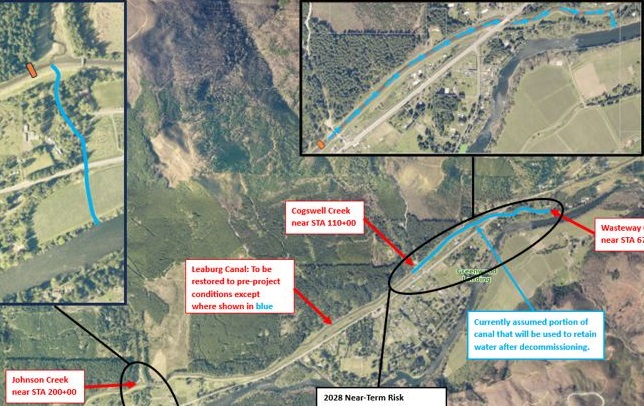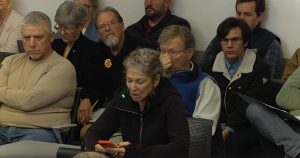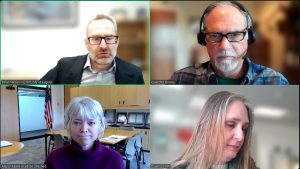EWEB approves first big contract in $180 million Leaburg Dam decommissioning
4 min read
Presenter: The $180 million project to decommission the Leaburg Dam just got real. EWEB brought on the same program management team that just removed four dams on the Klamath. At the Dec. 3 meeting of the board, Commissioner John Barofsky:
[00:00:15] John Barofsky (EWEB commissioner): We’ve made some great steps going forward with the decommissioning action plan, but to me now, this is starting to get real. You know, when you start budgeting $18 million, we’re starting to get real. I’m just wondering if staff wanted to just give a little bit of an update on this contract before we approve it.
[00:00:37] Presenter: It’s actually for $18.5 million. EWEB’s Lisa Krentz:
[00:00:41] Lisa Krentz (EWEB): The specific scope is around program management and owners’ representation throughout the Leaburg decommissioning process, which is why it’s a longer contract than usual at 10 years rather than five, because we want to make sure that we’re able to maintain consistency throughout this comprehensive process towards decommissioning.
[00:01:01] And we did go through a public RFP process, a very comprehensive one. And I personally am incredibly excited to put forth McMillen for this work. McMillen is a very well-suited firm for this process with extensive decommissioning experience nationwide, including recently, a primary role in the decommissioning of the Klamath dams, to great success. They’re highly regarded throughout the industry. They have absolutely stellar recommendations from those who have worked with them. And it is, again, a sizable contract and a long contract, but I couldn’t be more pleased with the result.
[00:01:40] Presenter: Commissioner John Brown:
[00:01:42] John Brown (EWEB commissioner): Are they just going to manage other people? Are they going to do with some of the work? Let’s talk about right-of-way or EIS/environmental impact statements. I mean, they are going to actually do that work or are they going to just oversee the work, so we could expect additional contracts on top of this, with other service providers?
[00:02:01] Presenter: Lisa Krentz.
[00:02:02] Lisa Krentz (EWEB): Yeah, very good question, Commissioner Brown.
[00:02:04] So, the way that we’ve focused this contract is with a lot of flexibility. So, they are to provide overall program management and owners’ representation, but the team that McMillen has put together, it includes their team. They have extensive geotechnical engineering and construction management experience. They have also put together subconsultants who are very experienced in the environmental fields and also in the legal process for FERC (Federal Energy Regulatory Commission).
[00:02:30] So the way the scope of services was written is that we have the ability to write task orders for specific projects if their team seems well suited to perform that work.
[00:02:42] They will be providing the overall program management helping us throughout the process, but there might be some specific engineering design or other types of projects that they are suited for. And if so, we would approve it or ask to approve a task order for that.
[00:02:58] Presenter: EWEB expects that McMillen will help with some design development, and with preparing permit applications. Lisa Krentz:
[00:03:05] Lisa Krentz (EWEB): Yeah, and then I would just add one more thing: It seems unlikely to me that we would get through this really complex, you know, $180 million project without the need for some additional consultant support along the way. That we have yet to identify and will come once we have further developed the plans.
[00:03:26] Presenter: Commissioner John Barofsky:
[00:03:27] John Barofsky (EWEB commissioner): So if we need another thing and they’re able to do it, would that mean that it would go out for another RFP or would they automatically get that bid?
[00:03:36] Presenter: Lisa Krentz:
[00:03:37] Lisa Krentz (EWEB): My understanding is we have flexibility in the contract the way the scope of services was written.
[00:03:42] Presenter: If McMillen is the best subject matter expert, EWEB has flexibility within the contract to create a task directly. Commissioner Barofsky:
[00:03:50] John Barofsky (EWEB commissioner): Okay, and then my next question is again, and it may not be directly relevant to this specific contract, but when I voted to move forward with the decommissioning, it was with kind of a caveat that we would have check-ins at points where there may be an opportunity to return the creeks to run of the river—Johnson Creek, Cogswell Creek. This wouldn’t preclude us from doing that at this point, correct? And that will still be looked at what through this contract, possibly?
[00:04:22] Lisa Krentz (EWEB): Yeah, that’s correct. And just as an overarching statement, we won’t be making major decisions around the end state of decommissioning without sharing updates with the board. So we plan to have frequent updates to the board and in addition to continue to report out quarterly in the quarterly reports.
[00:04:40] But no, nothing in this contract precludes any of that. In fact, having McMillen and a comprehensive team like this on board, I think, will help us realize our goals of what is the most effective and efficient long-term solution.
[00:04:56] John Barofsky (EWEB commissioner): Yeah, yeah, I just wanted to make sure that we didn’t get so far along the road that we get to a point where they say, ‘Well, we’ve gone so far. It doesn’t make economic sense to even look at that anymore.’ And that’s something I wanted to make sure I voiced.
[00:05:09] Presenter: General Manager Frank Lawson:
[00:05:11] Frank Lawson (EWEB, general manager): Commissioner Barofsky, this is the kind of expertise that would inform check-ins like that, and so this is actually a necessary part of that process.
[00:05:19] Presenter: EWEB approves the first $18.5 million of its estimated $180 million program to decommission the Leaburg Dam. McMillen comes to the project after the decommissioning of the Klamath’s Copco Number 2 in 2023 and three other dams in 2024. Just months after they finished, during the fall run, Chinook salmon were spotted above the former JC Boyle dam site for the first time in over a century.






